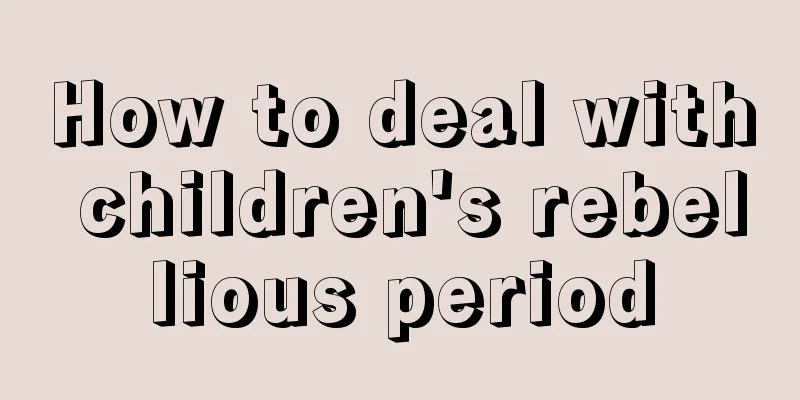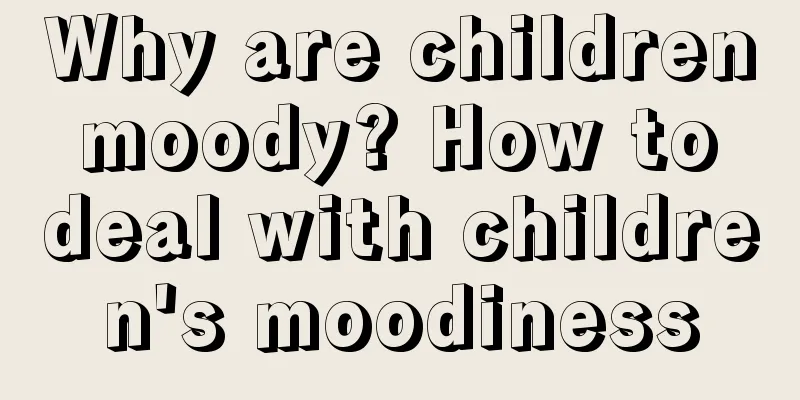How to deal with children's rebellious period

|
It is normal for children to have a rebellious period. Many children will have a rebellious period when they reach a certain age. So here we need to understand the manifestations of children's rebellious period. How should parents deal with children's rebellious period? Children's rebellious behaviorThey are highly destructive, stubborn, have intense emotional reactions, have unstable tempers, and have poor emotional control. For example, they are easily excited, refuse to do what their parents ask them to do, and want to do things that are forbidden. They ignore their parents and would rather play by themselves than with their parents. They have a strong rebellious mentality, always feel that the teacher is unfair to them or that their parents always restrict them, so they will try to confront authority, such as quarreling with their parents and going against their teachers. They deliberately break the rules that were set before; they constantly make new demands, negotiate with their parents, and are willing to do things only when the requirements are met. They may have a particularly strong vanity problem, such as loving to buy branded goods or liking to dress themselves up. When playing with other children, they fight for the same toy, fight for the order of priority, are unwilling to share toys with others, but love to grab other people's toys, and even beat people in serious cases. How should parents deal with children's rebellious period?First of all, parents should talk to their children on an equal footing. In the face of the baby's unreasonable behavior, if you forcibly use the authority of parents to confront the child, it will only backfire. It is better to squat down and have an equal dialogue with the child to understand the child's true inner demands. If the baby has a problem that cannot be solved, parents can also help to make suggestions. Secondly, do not beat or scold the child. Children in the rebellious period have a rebellious mentality. The more you sing against her and beat and scold her, the more she will resist. Therefore, parents must calm down and do not beat or scold their children, otherwise it will make the child timid and inferior. Thirdly, encourage and recognize the child appropriately. Children are eager to be recognized by adults. Even if they are doing something you think is wrong. You might as well do the opposite, first recognize his ideas and practices, and then wait until his mood calms down, and then express your opinions and say what you think is the right approach. That is, "delaying tactics", giving the child a certain amount of time to calm down, and then recognizing and encouraging him, may receive different results. What happens when children are in their rebellious period?The main manifestations of children in the rebellious period are as follows: 1. The temper is particularly unstable and the emotional control is relatively poor, such as being easily excited, yelling at parents because of small things, and losing temper, sometimes always feel that parents are particularly nagging and even can not listen to parents' opinions and suggestions. 2. There is a strong rebellious mentality, always feel that the teacher is unfair to them or parents always restrict them, so they will try to confront authority, such as quarreling with parents, going against teachers, etc. 3. There may be a problem of being particularly vain, such as loving to buy branded things or liking to dress up, and some women even dress themselves up to be particularly mature and sexy. If the above problems and manifestations have appeared, it is very likely that they have entered puberty and are currently in the rebellious period. What does it mean when a child is in rebellious period?Children's rebellious period is divided into two periods, early childhood and adolescence. In early childhood, after the age of two, babies' language ability develops rapidly and they gradually develop self-awareness. When their desire to act independently is restricted by adults, and their verbal expression and control abilities are weak at this time, they fight against restrictions by throwing tantrums, which is called the first rebellious period. Although adolescents are not financially independent, they psychologically hope that others will agree with their ideas and try to act according to their own wishes. They do not want their parents to interfere too much. However, due to their lack of social and life experience, they are not careful about the consequences and are obviously childish and blind. They are prone to conflicts in concepts and behaviors at home and school, which is also called the second rebellious period. |
<<: What is the impact of ADHD on children in adulthood? What is the impact of ADHD on children?
>>: 3 things you shouldn't do in front of your children
Recommend
What harm does IVF failure have on women's bodies?
For many infertile couples, IVF is a major decisi...
How much fruit should pregnant women eat every day? How much fruit should pregnant women eat every day?
Eating fruits has many benefits for our body and ...
What are the symptoms of postpartum urinary incontinence? What is the best treatment for postpartum urinary incontinence?
Postpartum urinary incontinence is a very embarra...
Does eating sweets affect children's growth? Does eating sweets affect children's height?
Will eating sweets affect children's growth? ...
Causes of Unplanned Pregnancy 15 Ways to Get Pregnant Unplannedly
Unexpected pregnancy is a phenomenon that many yo...
Will eating water chestnuts cause miscarriage? What will happen if a pregnant woman eats water chestnuts?
Water chestnut is a food that many people like. W...
Does the age of the couple affect the success rate of artificial insemination?
Although artificial insemination is a way to trea...
At what age can a baby use a pacifier? Can a baby sleep with a pacifier in his mouth?
The function of a pacifier is to soothe the baby&...
What should I do if my baby spits up yellow milk? Will my baby spits up yellow milk?
What should I do if my baby spits up yellow water...
How many degrees of myopia will be inherited? More than 600 degrees
Generally speaking, myopia of more than 600 degre...
How many fingers should be opened during childbirth? What is the process of opening the fingers during childbirth?
I heard that when expectant mothers give birth, t...
Will the fetal heart rate be normal if the fetus is hypoxic? Will the fetus still hiccup if it is hypoxic?
Pregnant women always pay attention to the condit...
Why can't I get pregnant during ovulation?
Ovulation is the best time for women to get pregn...
What kind of soup is good for pregnant women? The nutritional value of soup for pregnant women
Pregnant women should supplement their nutrition ...
Is it dangerous to have low blood pressure during childbirth?
Some pregnant women do not pay attention to their...









